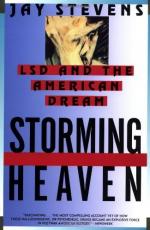|
This section contains 5,400 words (approx. 18 pages at 300 words per page) |

|
What Kind of Drug Is It?
LSD (lysergic acid diethylamide) is a powerful PSYCHEDELIC DRUG made from a naturally occurring compound called lysergic acid. This is how the drug got its nickname "acid." LSD is classified as an HALLUCINOGEN by the U.S. Drug Enforcement Administration (DEA). The National Institute on Drug Abuse (NIDA), in "NIDA InfoFacts: LSD," has called it "one of the most [powerful] moodchanging chemicals" known. LSD alters the way the brain works. In microscopic amounts, it affects the user's senses, thoughts, and movements for ten to twelve hours.
Unlike some other hallucinogenic drugs such as mescaline, LSD can only be produced under laboratory conditions. (An entry on mescaline is available in this encyclopedia.) LSD is termed a semi-synthetic drug rather than a pure synthetic drug because the key ingredients used in its manufacture are found in nature.
Overview
|
This section contains 5,400 words (approx. 18 pages at 300 words per page) |

|


